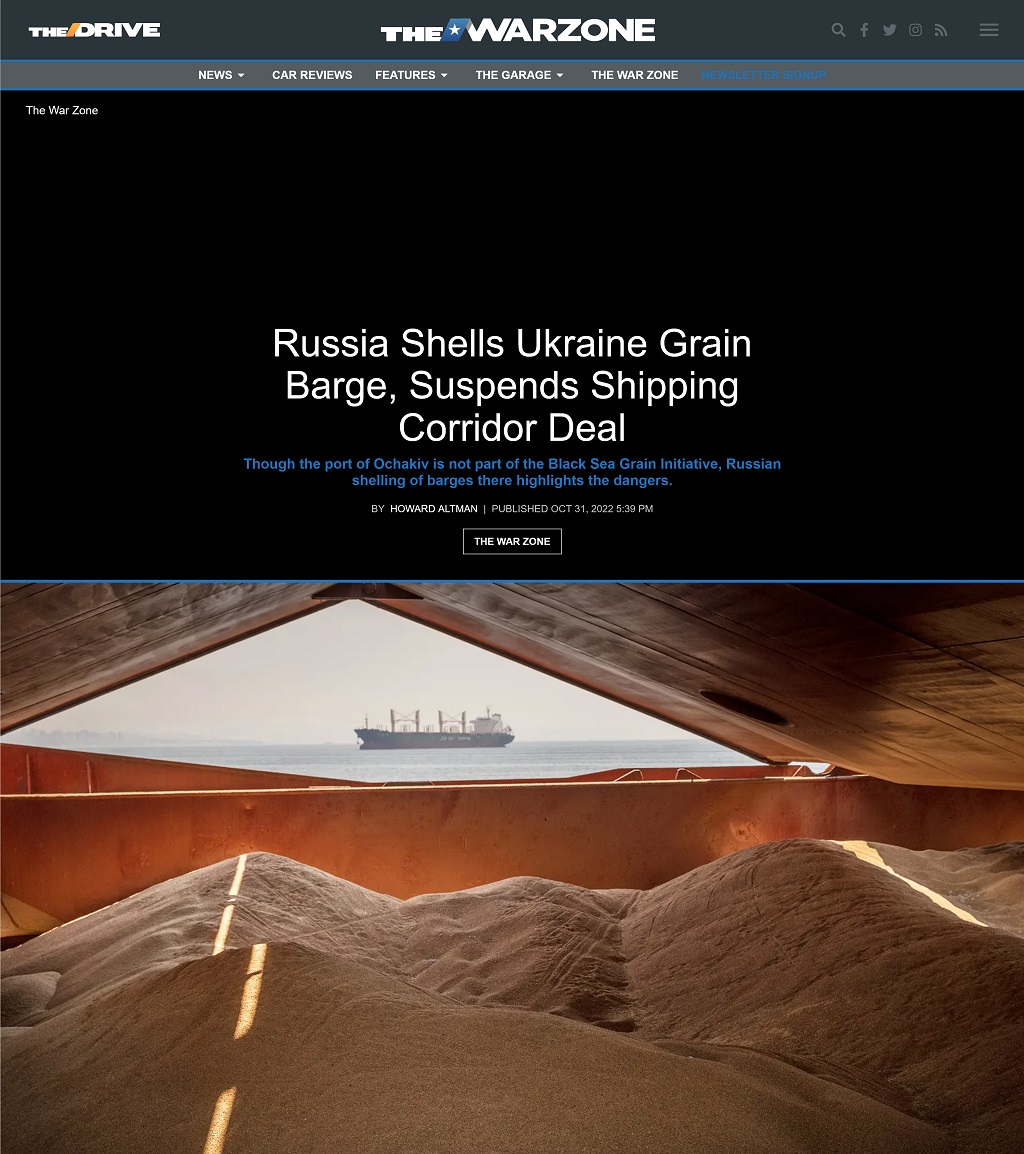Though the port of Ochakiv is not part of the Black Sea Grain Initiative, Russian shelling of barges there highlights the dangers.
Russian forces on Monday shelled Ukraine’s Black Sea port of Ochakiv, ”hitting two port civilian tugboats, which were involved in the transportation of a barge with grain,” Ukraine’s Operational Command South said on its Facebook page.
As a result, “a fire broke out and control of the vessels was lost. Two crew members were killed, one was rescued with injuries, the fate of another is unknown.”
The port of Ochakiv is not part of the Black Sea Grain Initiative, hammered out over the summer to allow grain and other food and fertilizer to be shipped out via Ukraine’s Black Sea ports of Odesa, Chornomorsk and Yuzhny. However, the incident highlights the precarious nature of that deal.
The shelling of those tugboats came as about a dozen ships full of Ukrainian grain are sailing through the Black Sea and Russia suspended its participation in that deal, which was brokered by Turkey.
The Russian Ministry of Defense (MOD) on Monday said it was suspending “traffic across the safety corridor” as well as its participation in the initiative until “the terrorist act committed by Ukraine on 29 October against the warships and civilian vessels in Sevastopol is clarified.”
On Saturday, that port city in Russian-occupied Crimea was the target of a multi-prong attack by sea and aerial drones, which we covered extensively here.
“We emphasize that the Russian Federation, as the main participant of the abovementioned agreements, does not withdraw from them, but suspends their effect,” the MOD said Monday on its Telegram channel. “In this regard, the vessel traffic across the safety corridor is unacceptable as Ukrainian leadership and the command of the Armed Forces of Ukraine use it for conducting operations against the Russian Federation.”
As a result, the Russian MOD said “there can be no question of ensuring safety to any facility in the abovementioned direction until the Ukrainian side assumes additional obligations not to use this route for military purposes.”
The Russian MOD, which said it has informed the UN about its decision, added that it was counting on “assistance from the international organization in obtaining Ukraine’s guarantees not to use the humanitarian corridor and Ukrainian ports, defined in favor of exporting agricultural products, for conducting operations against the Russian Federation.”
Ukraine officials have not officially responded to Russia’s allegations.
The U.N. on Monday said no ships involved in the grain deal were in that corridor.
“None were in the corridor on the night of the 29th of October when the reported attacks took place, and no vessel reported an incident over the weekend,” U.N. aid chief Martin Griffiths told the U.N. Security Council on Monday, according to Reuters.
“Today 12 ships sailed out from Ukrainian ports and two headed in to load food,” Griffiths told the 15-member council.
The ships, carrying about 390,000 tons of agricultural products, left Ukrainian ports including Odesa on Monday, the New York Times reported.
With Russia suspending participation in the deal and saying that vessel traffic across the safety corridor was unacceptable, it remains to be seen if and when further such shipments will resume, especially since the implied Russian threats will make insuring vessels taking part in such operations prohibitive at best.
PHOTO 1: Fishermen are seen against one of the bulk carriers that entered the port of Odesa under the Black Sea Grain Initiative, Odesa, southern Ukraine. (Yulii Zozulia / Ukrinform/Future Publishing via Getty Images)
However, given that Russia has used this deal, set to expire in November, as a bargaining chip, there is at least some hope that Moscow will relent in order to continue to gain leverage.
Alexandra Prokopenko, an independent analyst and an expert on Russia who writes for the Carnegie Endowment for International Peace, told the Times that the deal was in effect a “political tool” for the Kremlin, which could see securing further exemptions on its own exports of food and fertilizer from so-called hidden sanctions, such as the elevated cost of insuring vessels, as a reason to renew or extend the deal, she said.
“Russia stopped the deal but it has opened a loophole for Turkey to negotiate,” she said, by keeping a presence at the Joint Coordination Center — which houses the team of officials from Russia, Turkey, Ukraine and the United Nations that monitor the grain ships.
Clearly, this remains a tense situation. We will be closely watching it and report on further key developments.
Contact the author: howard@thewarzone.com


